Special Report: Puerto Rican Swimming In the “Toughest Fight in the History of Our Island”
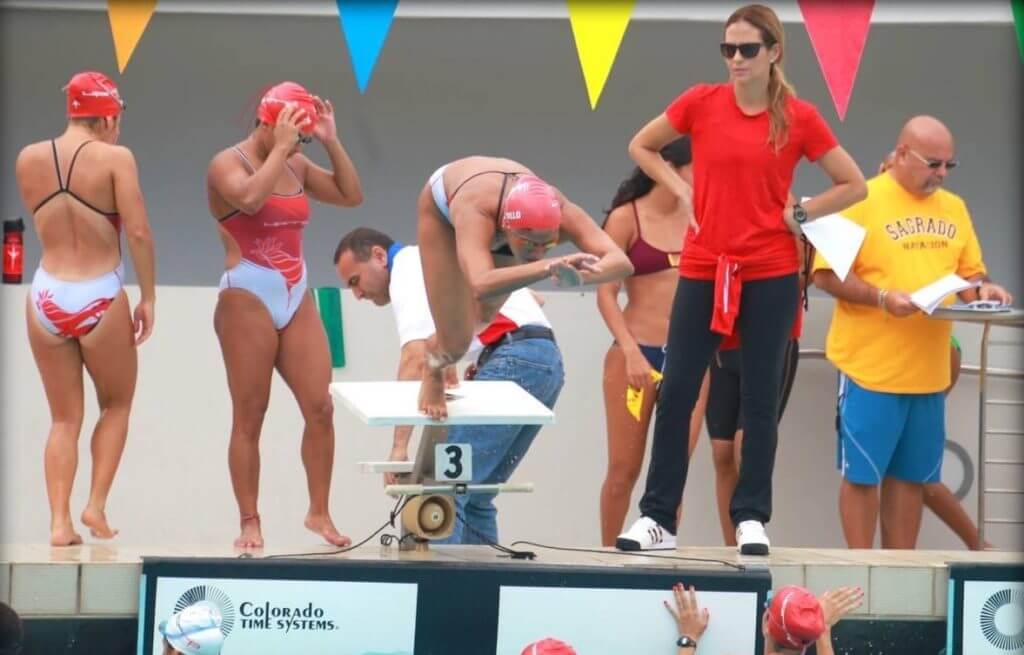
One week ago, Fernando Delgado was elected to a four-year term as president of the Federación Puertorriqueña de Natación (FPN). It’s an auspicious moment to take over Puerto Rico’s national governing body for aquatic sports; the past few years the island has been buffeted by a string of unfortunate events.
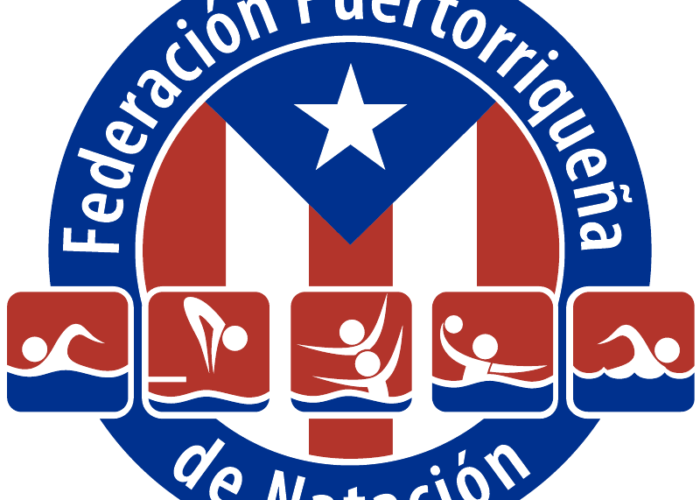 “In 2017, we were impacted by Hurricane Maria, which affected the aquatic facilities of Puerto Rico,” Morgan Toro, outgoing FPN president, explained in an email. “We got up with great effort in 2018 and 2019. Then, 2020 began with earthquakes that brought us back to our knees. The COVID-19 pandemic hit us hard… [causing] our 1,000 swimmers to be out of the water for most of the year.”
“In 2017, we were impacted by Hurricane Maria, which affected the aquatic facilities of Puerto Rico,” Morgan Toro, outgoing FPN president, explained in an email. “We got up with great effort in 2018 and 2019. Then, 2020 began with earthquakes that brought us back to our knees. The COVID-19 pandemic hit us hard… [causing] our 1,000 swimmers to be out of the water for most of the year.”
Delgado, who narrowly outpolled Karen Oyola for the presidency, offered unity as a means to combat the FPN’s current ills.
“Our campaign focused on being inclusive; we want to hear, understand and work for every member,” he said in an interview with Swimming World. “To be able to achieve excellence in our sport, we need the help and collaboration of everyone.”
[On The Record with Fernando Delgado, New President of the Puerto Rican Swimming Federation]
It will take more than a positive message to overcome what may be the most challenging stretch in the history of swimming on the island.
Competitive swimming is not the only aquatic sport adversely impacted by aquatic facilities still unfinished and athletes unable to train due to COVID-19 restrictions. Delgado, a protégé of Germán Rieckehoff, the highly regarded sports administrator who for years led the Puerto Rican Olympic Committee, is now also responsible for diving, open water swimming, synchronized swimming and water polo—all of which have been furloughed by Covid.
But events the past three years are not solely to blame for the FPN’s sagging fortunes. Participation in youth swimming has declined precipitously over the past two decades, perhaps the new president’s biggest challenge.
It’s all about the facilities—and the government that funds them
The lasting legacy of Maria is thousands of deaths and billions of dollars in property damage—an impact still felt years after the hurricane swooped in. Diana Cintron, head swim coach for the Escuela del Deporte de Carolina team, waited three years for her home pool to reopen. And when it finally did, the virus struck.
“I haven’t touched my own pool since 2017,” Cintron said last weekend. “I was going to start in March, [but] then Covid-19… we couldn’t do it.”
Thus, one of Delgado’s first actions as president will be fact-finding meetings with the island’s 27 swim clubs. A critical question: what is the state of their pools?
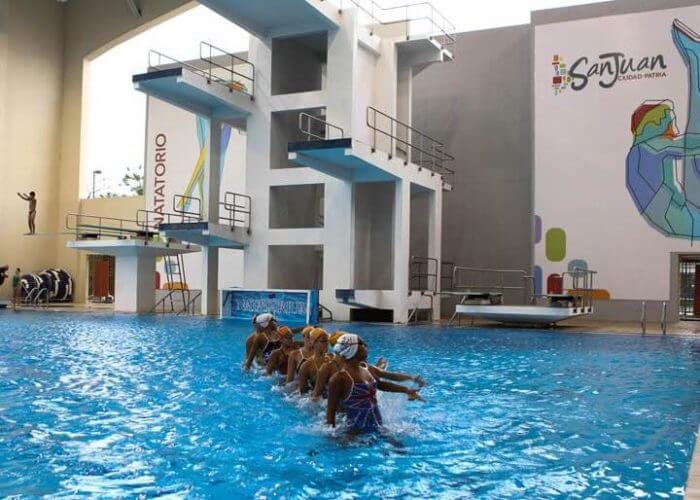
The Natatorium in San Juan. Photo Courtesy: FPN
He plans to work with politicians, administrators and pool operators to get aquatic athletes back in the water, ideally as soon as November. He will need to step up training; the CCCAN (Central American and Caribbean Amateur Swimming Confederation) Games are scheduled for June 2021.
Key to Delgado’s candidacy was outreach to the politicians that control the purse strings for facilities and various athletic organizations, which included a letter-writing campaign to the six candidates vying to be the next governor of Puerto Rico. Interestingly, that group does not include Wanda Vázquez, the current governor, who lost her party’s nomination to Pedro Pierluisi.
Delgado points out that refurbishing pools is not the only issue. The Natatorium in San Juan—second only to the country’s Olympic facility in Salinas—remains closed because Carmen Yulín Cruz Soto, San Juan’s mayor, won’t open it.
COVID-19 remains a critical issue. San Juan and its suburbs, home to many swim clubs, contains the island’s highest concentration of coronavirus cases. Until the Department of Sports and Recreation and the Department of Health sign off, obstacles remain to resuming athletic activities—even though swimming has been shown to prevent the spread of the virus.
FPN member clubs must get government approval for training to resume. While swimming is currently allowed, it is limited to select facilities, and all other aquatic sports remain on hold.
“We need permission for the rest of the disciplines, synchronized swimming, water polo and diving,” Delgado said. “But, because of elections, we have to wait until after November 3 for who wins [the governor’s seat], so that we’re going to start that in January.”
Treat all water sports the same
A long-standing issue is that not all FPN disciplines coexist equally. Puerto Rico has had notable swimming success, with numerous Olympians—including Sonia Álvarez, Carlos Berrocal, Ricardo Busquets, Fernando Canales, Rita Garay, Vanessa García, Gretchen Gotay, Manuel Guzmán and Miriam Sheehan—among others. (Even though it is a U.S. territory, the island maintains its sports independence. Puerto Ricans get to compete under their own flag in international competition.)
For Gotay, who represented Puerto Rico in the 2004 Athens Olympics, the biggest challenge is a lack of young athletes learning to swim. Her club, Streamline Swim Academy, has returned to practice, which Gotay knows is significant.
“Right now, with all the challenges—not only swimming, [but what] all the sports are facing… we have a competitive advantage over other sports, because ours is an individual sport,” she said. “We can start training—other sports are not allowed yet to start.”
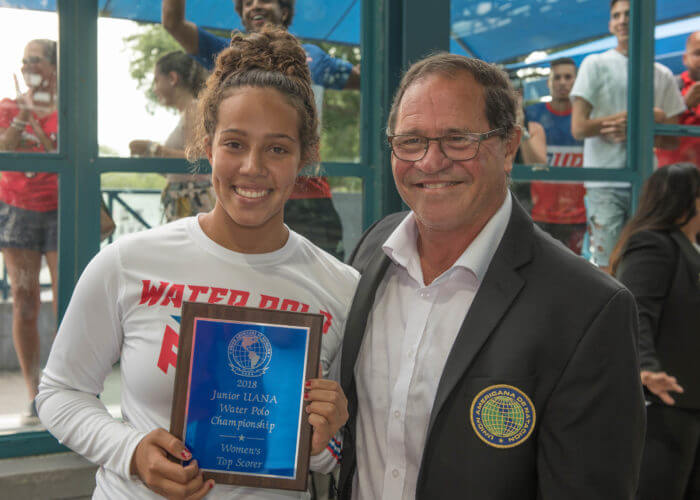
Manuel de Jesus and Milena Guzman in 2018. Photo Courtesy: Peter Laurence
But not every aquatic sport has been cleared to return. Water polo, a contact sport, remains sidelined. The good news is that one of Delgado’s chief advisors is Manuel de Jesus, chair of the Union Americana de Natacion (UANA) Technical Water Polo Committee (TWPC) and a long-time age group and national team coach.
de Jesus, whose brother Jose, a swimming Olympian for Puerto Rico who is a past FPN president, speculated that Delgado will tackle one of the biggest criticisms of the federation—that funding is not distributed equitably. In an email, de Jesus speculated that the FPN will become an “aquatics federation,” meaning that every discipline will have fiscal and administrative autonomy. Canada and the U.S. structure their individual aquatic sports in a similar manner—with funding allotted based on each discipline’s long-term plans and goals.
Just get in the water and swim!
Oddly, for an island nation in the Caribbean, not enough Puerto Ricans swim, something Delgado hopes to remedy—a change that would stem the long-term drain of young athletes to other sports, including basketball, baseball and soccer.
“For years we have tried to educate the government that swimming should be an essential class; people would do more recreation in our natural bodies of water,” he said. “This can potentially result in a rise of aquatic athletes and clubs.”
Cintron, the swim coach from Carolina, believes that under Toro, Delgado’s immediate predecessor, swimming was growing again in Puerto Rico. Then came Covid.
“Morgan —our ex-president—did a great job,” she said. “Not only for swimming, but for administration, too. We had a situation, two hurricanes that came to Puerto Rico, and he worked on them. Then he had the pandemic.”
The new president has a fan in Cintron, who swam for Puerto Rico in the ‘70s and has remained in the sport since, coaching at a variety of levels.
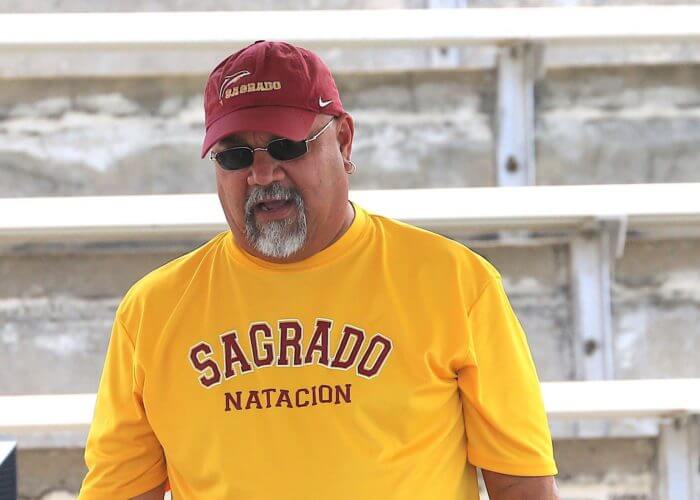
Fernando Delgado. Photo Courtesy: F. Delgado
“[W]hen Fernando finished [Saturday] he sent a message: he’s not only for swimming,” she said. “He going to work with the other disciplines. And he’s going to concentrate on those kids at the smaller ages—we can’t forget about them.”
Gretchen Gotay believes the future of the FPN hinges on a leader who is creative—especially when it comes to competition.
“We need a leader focused on the motivation of the swimmers—how we can keep the athletes in the water without the goal of a swimming meet,” she said. “Usually they’re motivated because of competition.”
Delgado is already engaged in this effort. He’s pursuing virtual competitions modeled on what USA Swimming has set up. He also understands that the pandemic is a global problem; the FPN is collaborating with its regional neighbors, and he’s prepared to dig in as much as possible to overcome Covid-19.”
Said Delgado, “We have to work hard with the other clubs in order to bring back the swimmers. That’s not only a Puerto Rican problem. This is a problem for the whole world: getting back the swimmers.”




Great article. We here in PR hope to get back to some sort of normalcy soon, it hard for. Head Coach to plan a season with no meets in the near future.
Thanks for your comments. Gretchen Gotay specifically spoke about the challenge of keeping athletes in a competitive mindset w/o actual meets.
President Delgado said he’s prepared to follow that US Swimmings example of virtual competition—and I was struck by his call for unity in this moment (a position I expect Morgan Toro also took); let’s hope that things move forward quickly for the new FPN head.
Your correspondent
Swam in Puerto Rico 4 years for training trips and this place stole my heart. As a coach today, I hurts to see they’ve been out for way to long. Would absolutely jump at the opportunity to coach up some young swimmers in the area!
Thanks for covering Puerto Rican Swimming disciplines.
Alfonso
Dear Coach Fernandez:
My pleasure! AND, I look forward to more discussions about Puerto Rican water polo, which is where my main interests lie.
Your correspondent